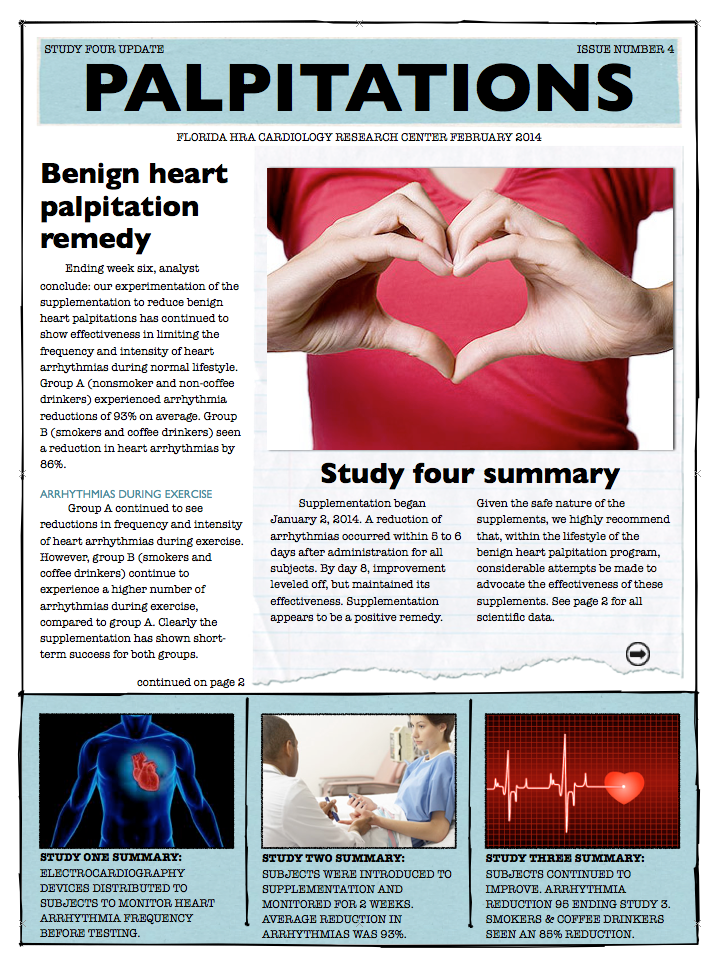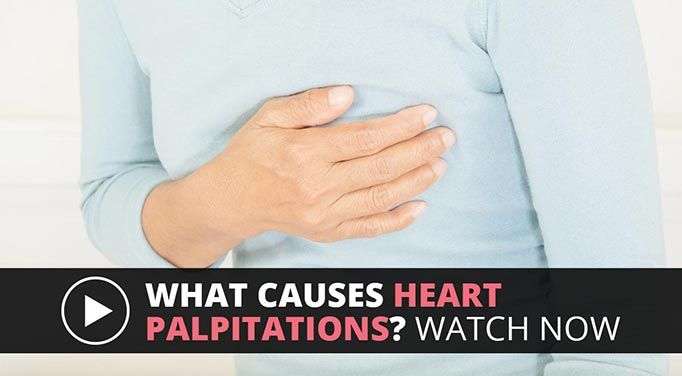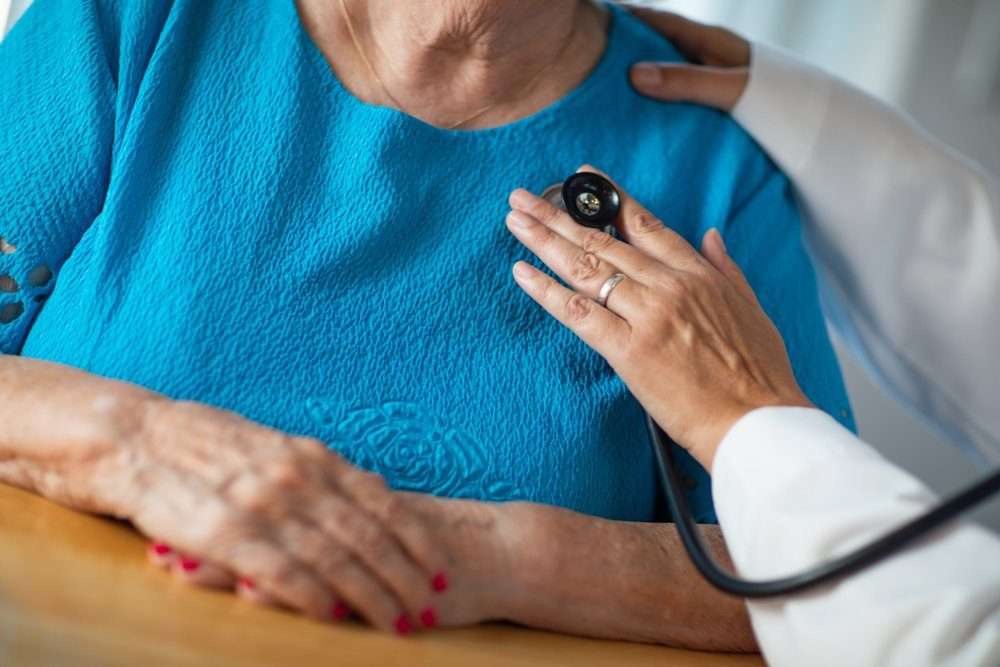Why Does My Heart Skip A Beat
There are several possible causes of heart palpitations.
Trouble from above.;Some palpitations stem from premature contractions of the heart’s upper chambers . When the atria contract a fraction of a second earlier than they should, they rest an instant longer afterward to get back to their usual rhythm. This feels like a skipped beat and is often followed by a noticeably forceful contraction as the lower chambers clear out the extra blood they accumulated during the pause. These premature beats are almost always benign, meaning they aren’t life-threatening or the sign of a heart attack in the making.
Two other heart rhythm disturbances that can cause palpitations from above are atrial fibrillation and supraventricular tachycardia. Atrial fibrillation is an irregular and often rapid heartbeat caused by chaotic electrical activity in the heart’s upper chambers. Supraventricular tachycardia is a faster-than-normal heart rate that begins above the heart’s lower chambers. Both of these may cause palpitations that may be brief or prolonged. Both should be evaluated by your physician.
Other sources.;Problems with the heart’s timekeeper, called the pacemaker or sinus node, can cause palpitations. So can a breakdown in the coordination between the upper and lower chambers. Scar tissue in the heart from a heart attack or other injury and valve problems such as mitral valve prolapse can also lead to palpitations.
When Are Heart Palpitations Dangerous
Sometimes, heart palpitations are connected to an underlying heart disease, especially when they are associated with other signs and symptoms. The warning signs associated with heart palpitations may arise if you have an underlying heart disease, which include:
- Continuous palpitations ;heart palpitations do not occur for a particular time; they can happen any time of the day.
- The onset of palpitations ;is very important to remember because the onset of your palpitations can indicate if your palpitations are a sign of heart disease. If the onset is gradual, it is very unlikely that your heart palpitations are due to an underlying heart disease. If your heart palpitations are a result of a serious heart disease, then the onset will be sudden. It will start abruptly, but also tend to disappear suddenly.
Simple Lifestyle Modifications That Lower Your Risk
Try to cut out any known triggers such as smoking, heavy alcohol use, caffeine and energy drinks. A lot of young people tend to overuse some of the energy drinks, which is one of the leading causes of palpitations. Pencil in some time for self-care to reduce stress levels and lower your chances of palpitations. Aim to drink six to eight glasses of water a day and get seven to nine hours of sleep a night, too.
Read Also: How Do You Calculate Max Heart Rate
Can I Experience Heart Palpitations During Panic Attacks
The startle effect releases substances in the body such as adrenaline which cause the heart rate to increase and the heart to beat more vigorously, creating a sensation of panic, heart pounding and heart racing. This is the experience of becoming aware of a natural or normal functioning of the nervous system. Anxiety, panic, and startling cause the adrenaline level to rise and create the sensation of palpitation.
What Can I Do To Prevent Palpitations

Depending on the cause of your palpitations, these tips can help you have them less often:
- Reduce your stress level or biofeedback techniques.
- Avoid or limit the amount of alcohol you drink.
- Avoid or limit the amount of caffeine in your diet.
- Do not smoke or use tobacco/nicotine products
- Exercise on a regular basis .
- Avoid foods and activities that trigger palpitations.
- Control your blood pressure and cholesterol levels.
Don’t Miss: Fitbit Charge 2 Accuracy Heart Rate
When Should I See My Gp About Palpitations
You should make an appointment to see your GP if:
- your palpitations last a long time, don’t improve or get worse
- your palpitations cause symptoms such as sudden dizziness, feeling short of breath, fainting, chest pain or tightness
- you have a history of heart problems
- you’re concerned about the palpitations.
What Are The Serious Causes Of Heart Palpitations
Heart palpitations may not only indicate an underlying heart problem; it could also be a part of many other diseases. Here are a few common causes of heart palpitations:
Don’t Miss: Tylenol Heart Palpitations
Other Warning Signs Include:
If you have any of these symptoms that are associated with heart palpitations, then it is more likely that you are suffering from an underlying heart condition. Therefore, consult your cardiologist as early as possible to exclude such dangerous conditions or to start treatment quickly. Your doctor will first start off by taking a detailed history regarding your heart palpitations and will ask you to describe the way you feel the palpitations. Your medical history will help your doctor know your heart rate and rhythm, which are essential to establish an accurate diagnosis.
Concerned About A Racing Heart During Sleep: How Serious Are Heart Palpitations At Night
“My heart skipped a beat”;is a phrase often used;to describe the feeling when someone is in love, or is scared, or experiences any other strong emotion. The saying;is true to an extent because, in reaction to any strong emotion, the body releases a hormone called epinephrine, which triggers the heart to beat faster, giving the feeling of “skipping a beat”.
Recommended Reading: Does Tylenol Raise Blood Pressure And Heart Rate
What Your Heartbeat Says About Your Heart
Palpitations are basically a heightened awareness of your own heartbeat, explains Swadia. Your heart might beat faster, slower or differently than usual for a few reasons.
- Rapid, fast heartbeat at rest could be caused by stress, caffeine, alcohol, tobacco, thyroid pills, cold medication, asthma drugs or diet pills.
- Sometimes low blood pressure , heart disease and some heart rhythm conditions can cause rapid heartbeat, too.
- A slow, forceful heartbeat might be a sign of heart rhythm problems such as bradycardia, in which your heart beats less than 60 times a minute.
- An irregular or fluttering heartbeat could be caused by atrial fibrillation , the most common type of irregular or abnormal heartbeat. Another heart problem, called premature ventricular contractions, can create this irregular beat.
It might be difficult for patients to describe how exactly their heart is feeling. And likewise, doctors sometimes have a hard time understanding what the patient is feeling.
Heart Palpitations: When Should You Worry
It seems as though almost everyone has heard a cautionary tale about heart health. An unrecognized symptom, an undetected heart condition, or pushing your heart to its maximum capacity during practice or time outdoors can all produce a dangerous, and sometimes fatal, result. Stories like these have prompted awareness about heart conditions and heart health, and have also helped to increase knowledge of which symptoms to keep an eye out for.
Heart palpitations, the feeling of a rapid, fluttering, pounding, or otherwise irregular heartbeat, is one of those symptoms. When these occur during physical activity or on particularly warm days, its a cue to slow or stop what youre doing. However, heart palpitations arent exclusive to situations like these. Anyone can be affected by that feeling of a fluttering heart, which is why understanding the causes and concerns associated with it can help you determine whether or not to worry.
Heart palpitations can be alarming, because your heartbeat feels abnormal, explains Richard R. McCurdy Jr., MD, Lankenau Heart Institute cardiologist at Riddle Hospital, part of Main Line Health. Fortunately, most palpitations are not dangerous and often can be explained by external factors.
You May Like: How Accurate Is Fitbit Charge 2 Heart Rate
What Heart Palpitations Are
Doctors consider a normal heart rate to be 60 to 100 beats per minute.;
In many cases, heart palpitations arent actually an increase or decrease in heart rate, says Dr. Melissa Robinson, a cardiac electrophysiologist at the UW Medicine Heart Institute who specializes in treatment of arrhythmias, also known as heart rhythm disorders.;
Palpitations can present as simply a heightened awareness of your heartbeat. The issue is whether or not they represent an arrhythmia, she explains.
That heightened awareness means you may perceive a change in your heartbeat that is actually normal and doesnt signify any underlying health issues. Since most of us dont go about our days hyper-aware of what our heartbeats feel like, just the act of noticing them can cause alarm.;
However, sometimes heart palpitations are actually from an arrhythmia where the heart beats faster or slower than normal, follows an irregular pattern or has extra beats.;
Arrhythmias are something to watch for because they may point to an underlying medical condition and may mean there is an increased risk of stroke or other cardiac events down the road.
About 50% of the time when people go to a doctor it ends up being normal rhythm, 20% of the time its extra beats, and the remaining 30% are actual arrhythmias, Robinson says.;
Its also important to note that these percentages vary according to different demographics. Older adults, for example, are more likely to have an actual arrhythmia.
Are Heart Palpitations Serious

Palpitations are very common. In general, palpitations are an unpleasant awareness of one’s heart beat. In most cases, they are more annoying than serious. They often occur if one is anxious, upset or angry and this would be considered a normal response to those emotions. You should seek help for palpitations if they cause, near fainting, fainting, shortness of breath or chest pain. If palpitations interfere with your ability to function they should also be evaluated. You do not necessarily need to go to a heart specialist for palpitations. Your primary provider can order a recording device that can be used to help diagnosis the cause of abnormal palpitations.
Recommended Reading: Can Constipation Cause Heart Palpitations
How Serious Are Heart Palpitations
Most of the time, your heart beats regularly and you dont notice it. But sometimes, a skip, flutter, or change in heart rate can catch your attention. These irregular heartbeats can happen while youre active or at rest, and they might make you worry about the health of your heart.
Irregular heartbeats, also called heart palpitations, can be unnerving, but they generally arent a sign of something more serious. But if you experience palpitations regularly or if you have an underlying heart condition make an appointment to have your heart examined.;
Kunal Patel, MD, and our team at NJ Cardiovascular Institute in Newark and Secaucus, New Jersey, have the expertise to diagnose and treat many common heart issues, including heart palpitations.
Are Premature Ventricular Contractions Life Threatening
If someone has normal heart function and no evidence of structural heart disease, the PVCs are a nuisance, but benign. If the PVCs are so symptomatic as to be disruptive, try eliminating all of the factors such as caffeine, certain foods, stress, before considering any treatment with medications. When we do treat with medications, we usually try to use simple medications such as beta-blockers first before going on to specific anti-arrhythmic agents. Very frequently, this is enough to improve patients’ symptoms.
You May Like: Does Tylenol Increase Heart Rate
Ask A Choc Doc: Are Heart Palpitations Dangerous
Question: Sometimes I experience heart palpitations. I want more information on what exactly causes them and if I can do anything to reduce their frequency. At what point should I mention this to my doctor? ;Anonymous
Answer:
A heart palpitation is the feeling of your heart beating too fast, skipping a beat, or fluttering in your throat, chest or neck.
Palpitations, also known as irregular heartbeats, are most likely caused by non-heart-related triggers. Strenuous exercises as well as strong emotions of anxiety or stress, most common among the younger generation, are frequent causes. Consuming caffeine, nicotine, alcohol, certain herbal supplements, cold and cough medication, or asthma medication, which all contain stimulants, as well as illegal drugs such as cocaine are common triggers. Some people report having palpitations after certain heavy meals that contain large doses of carbohydrates, sugars or fat. Sometimes, eating foods with excessive amounts of sodium can bring them on as well. However, some palpitations are caused by actual medical conditions including cardiac arrhythmias, thyroid disease, anemia, low blood pressure, fevers, and dehydration. If palpitations ever occur with chest pain, exercise, or fainting, this could represent a cardiac arrhythmia, and you should notify a physician.
Here are some helpful questions to keep in mind before seeing your doctor:
Living With Heart Palpitations
If you can understand what is causing your palpitations, you will likely be able to manage them. You will be able to avoid known triggers, like diet pills, caffeine, and cold/cough medicines.
Palpitations that are caused by anxiety or stress are sometimes harder to control. The anxiety can cause the palpitations, and the palpitations can create anxiety. These often make up a seemingly endless cycle. In these cases, your doctor may prescribe a medication to help ease anxiety.
Don’t Miss: Reflux And Palpitations
Heart Palpitations: When Is It Serious
This post is available in: Spanish
Having heart palpitations is often associated with a racing heart beat. But the term covers other irregularities related to the bodys electrical system that should generate a normal pulse.
The sensation of skipping a beat or a racing pulse is when the hearts electrical impulses are thrown out of rhythm. Arrhythmia refers to an abnormal heart rhythm, which may feel like a fluttering or a brief pause in beats. The condition can also result in a slowdown or acceleration of your heart rate.
Atrial fibrillation, also called AFib, is a type of irregular heartbeat that can result in blood clots, stroke, heart failure and other heart-related complications. At least 2.7 million Americans are living with AFib.
Video by George Carvalho and Alcyene C. de Almeida Rodrigues
Heart palpitations can be a serious problem having to do with the electricity of the heart, said Rozan Razzouk, M.D., a family medicine physician with;Baptist Health Primary Care.;You can have a skipped heart beat. Its not just something related to the heart beating too fast. It could be arrhythmia, atrial fibrillation or tachycardia.
Any type of arrhythmia can be detected by a primary care physician during a thorough checkup.
An electrocardiogram is a simple test that detects and measures the hearts electrical activity. Its the most common test used to diagnose arrhythmia.
Watch the video now for more on heart palpitations from Dr. Razzouk.
Diagnosing Heart Palpitations With Severe Symptoms
If the patient’s symptoms are more severe, such as significant lightheadedness or loss of consciousness associated with palpitations, a more comprehensive evaluation is warranted. That type of evaluation might well involve an ultrasound of the heart, a treadmill test, more sophisticated blood tests including thyroid tests, and an ambulatory EKG or Holter monitor. Some patients may require invasive studies if a serious heart condition is suspected to underlie the symptom of palpitations.
Read Also: Which Of The Following Signs Is Commonly Observed In Patients With Right-sided Heart Failure
Are There Any Complications Associated With Heart Racing At Night
The risk of suffering from complications is very low. However, if theyre caused by heart disease, the risk is very high. In addition, you may faint because your blood pressure will drop when your heart is beating too fast.
Also, suffering from a stroke is a concern. For example, when dealing with atrial fibrillation, blood clots will form. Then, if these detach, they can obstruct brain circulation.
Palpitations can also be a symptom of cardiac arrhythmia. This condition causes the heart to beat ineffectively and can lead to cardiac arrest.
Medical Treatment For Heart Palpitations

If self-help techniques don’t work, and palpitations are still bothersome, you may want to try some medical options. Medications called beta blockers are sometimes used to treat heart palpitations. They slow the heart rate and control the flow of “beat now” signals that regulate the heartbeat.
Sometimes a medical procedure called an ablation is needed. It can control palpitations caused by errant electrical signals in the heart.
Don’t Miss: Does Tylenol Increase Heart Rate
At The Doctors Office
Your doctor will:
- Give you a physical exam
- Take down your medical history
- Want to know about your current medications, diet, and lifestyle
- Ask for specifics about when, how often, and under what circumstances your palpitations occur
Sometimes, a blood test can help your doctor find the cause of your palpitations. Other useful tests include:
Electrocardiogram: This can be done while youâre at rest or exercising. The latter is called a stress EKG. In both cases, the test records your heart’s electrical signals and can find unusual heart rhythms.
Holter monitoring: Youâll wear a monitor on your chest. It continuously records your heart’s electrical signals for 24 to 48 hours. It can identify rhythm differences that weren’t picked up during an EKG.
Event recording: Youâll wear a device on your chest and use a handheld gadget to record your heart’s electrical signals when symptoms occur.
Chest X-ray: Your doctor will check for changes in your lungs that could come from heart problems. For example, if they find fluid in your lungs, it may come from heart failure.
Echocardiogram: This is an ultrasound of your heart. It provides detailed information about its structure and function.
If necessary, your doctor may refer you to a cardiologist for more tests or treatment.
